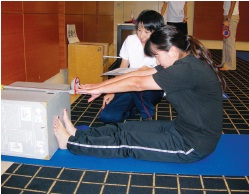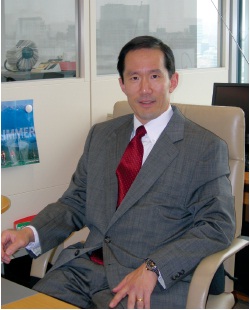by Linda Ozawa
LOHAS stands for “Lifestyles of Health and Sustainability.” If you know that, then you very well may be among the 29 percent of the population in Japan that practices LOHAS. Perhaps you do yoga instead of getting a massage, or take the stairs instead of the elevator. You may even pay attention to the products you buy and the companies you affiliate yourself with. Is the car you buy environmentally friendly? Are the companies you buy stocks for socially and economically sustainable? If you don’t, you may be in the minority in the near future. More and more consumers are now using LOHAS to influence their purchases.
Motivation to get or stay
healthy is certainly in line with
LOHAS, and it is also in line
with improving productivity
This is leading many companies to wake up to the movement. Why? Because it’s beneficial to them. After the award-winning documentary Super Size Me brought attention to McDonald’s trans-fat drenched menu, the motivation behind the fast food chain’s new healthy option menu may have been to bring back lost revenue. According to some sources, LOHAS marketing makes up “$227 billion market segment in the United States” (www.wikipedia.org). To stay competitive, McDonald’s turned to LOHAS, and with figures like the above, more and more will too.
Show Me the Money!
At the heart of the corporate LOHAS movement is the fact that it makes economic sense. According to www.lohas.com, LOHAS companies “practice ‘responsible capitalism’ by providing goods and services using economic and environmentally sustainable business practices.” Until LOHAS came along, the words “responsible” and “capitalism” may have seemed like an oxymoron. But as the following case study shows, these days, the two concepts are very intertwined.
Look Who’s Coming to Dinner
On Oct. 4, a group of about 21 employees of Amway Japan, the global network business company, were selected randomly and invited to a macrobiotic dinner at J’s Kitchen, a vegan restaurant in Minami Azabu. Invitations were sent out a week before to the employees. According to Gary Sumihiro, COO of Amway Japan and a big believer in LOHAS, part of the reason was to say thank you to his employees. After all, a happy workforce is part of creating a sustainable workforce. But the big reason behind this thank you dinner was to promote healthy living in their employees. “Amway sells health and beauty products. We promote a healthy lifestyle, and you have to live by your values,” says Sumihiro.
Once the dinner got underway on the second floor of the spacious restaurant, the invited employees all seemed as if they were enjoying themselves. After a toast (with, what else, organic champagne) led by Sumihiro, I asked a smiling employee what his favorite food is. “I love ramen!” he declared, “but today is my healthy day.” I then asked the woman next to him how she felt when she was invited. “I was the only one in my department. I felt very curious and also really happy to be invited.” When I asked her if she plans on working for Amway in years to come, she said yes.
Indeed, Sumihiro is quick to point out that employee satisfaction for Amway is very high. And the LOHAS techniques implemented may be one of the factors behind this.
Weighing In
To find out more about the connection between business and LOHAS, Sumihiro took me on a tour of Amway Plaza Tokyo and Auditorium, the Amway office building in Shibuya. Today happened to be the second day of physical fitness tests for their employee challenge program. Employees can voluntarily undergo a health check-up, after which they are given a set of criteria by which to improve their health. After a year, all employees who have improved their health sufficiently and attained their health goals are awarded ¥100,000. The physical fitness tests were scheduled for three days, but due to popular demand, extended to four. Sumihiro tells me that over half of all the employees in the building (that’s over 300) have participated.
Motivation to get or stay healthy is certainly in line with LOHAS, and it is also in line with improving productivity. “I’ve even given people my own money to quit smoking,” says Sumihiro, and it’s not solely their health he has an interest in. “Employees are an investment, and this [encouraging employees to quit smoking] is really a way to cut down on productivity loss from illness and other factors.”
Health is a running theme throughout the company, and throughout Amway Plaza Tokyo. “Please take the stairs,” says a sign under the elevator buttons. Sumihiro himself walks up the 12 flights of stairs to his office. Even the food in the cafeteria is all calorie labeled. Amway employees are not forbidden from making unhealthy choices in their lunch, but they are fully aware of the calories they are consuming when they order that oily ramen. Sumihiro is also working on encouraging people to run through Yoyogi Park, which is located right in front of their offices, during their lunch break.
The Products
Sumihiro then takes me to the first floor of Amway Plaza Tokyo. In the area, which is also open to the general public, there are demonstration areas for various Amway products. I can see the LOHAS philosophy extends very much to their products, which are in line with health and sustainability. Pointing out a high-tech, powerful looking water-filtering system, which clears out unnecessary elements as well as neutralizes viruses and other germs so you can drink, cook, and bathe in peace, Sumihiro said, “Amway is one of the only companies that is involved in the whole process of production, from the farms to the distribution,” he adds, pointing out a shelf full of vitamins, before further explaining the process that went into the purchasing of an acerola cherry farm for their acerola cherry supplements. The philosophy seems to be that, maintaining a healthy and sustainable approach in all aspects of the business will lead to success.
Mutually Beneficial
From cherry farms to calorie counting, Sumihiro knows the benefits that a healthy and sustainable approach can provide. Not only are people happier when healthier, LOHAS also affects the bottom line. “I don’t need salaried employees, I need contributing citizens,” he said at one point during my tour of Amway Plaza Tokyo. And this may be the overriding reason behind LOHAS implementation by major corporations such as Amway. When it comes down to it, a healthy and sustainable lifestyle is good business.











